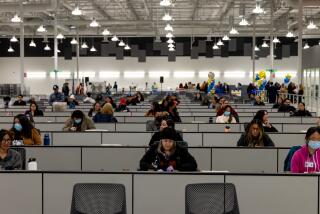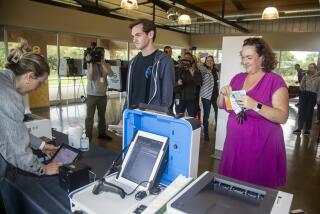Must Reads: Negotiating and name-calling as California lawmakers head off ballot battles

A crosscurrent of deadlines governing November’s election and the legislative process led to a chaotic week of policymaking in Sacramento, as lawmakers hurriedly acted on Thursday to expand consumer privacy rights and limit local soda taxes rather than see interest groups take both issues to the fall ballot.
A third proposal, asking taxpayers to subsidize lead paint cleanup projects, was withdrawn by paint companies in exchange for lawmakers scrapping a slate of bills designed to impose new rules on the industry.
When the dust had settled, there was relief from those who dreaded three separate, and costly, ballot measure campaigns. But far more participants seemed to think the final frenzy of wheeling and dealing had served no one well.
“Extortion is defined as the practice of obtaining something through force or threats,” Assemblyman Jim Wood (D-Healdsburg) said during a fierce debate on the Assembly floor. “That’s what’s happening this week.”
California lawmakers have banned local soda taxes for the next dozen years »
Thursday marked the deadline for elections officials to certify the list of statewide ballot measures voters will consider in November. Under a rarely used 2014 state law, an initiative’s proponents can cancel their plans if they decide to instead work with the Legislature to craft a compromise.
The challenge was that a different law — enacted by voters in 2016 — bans the state Senate and Assembly from taking final action on any bill until it’s been available for public review for 72 hours. That meant even though Thursday was not too late by election standards to fine-tune the policy plans, the real deadline had already come and gone.
“We find ourselves truly between the biggest rock and the smallest hard space,” said Senate President Pro Tem Toni Atkins (D-San Diego)
While three initiatives were withdrawn from the November ballot, no compromise was reached on a fourth ballot measure, to allow more cities and counties to impose local rent control rules. That proposal will appear, as planned, on the Nov. 6 ballot.
The focus of much of the week’s attention was AB 375, the quickly drafted law offered in exchange for the removal of the consumer privacy initiative. Gov. Jerry Brown signed it into law less than two hours after it cleared the Assembly.
Under the new rules which take effect in 2020, Californians will have a right to know what information a business has about them, prohibit companies from selling that information and ask businesses to delete their personal information after it’s been provided. Consumers would be able to sue companies if a data breach leads to their unencrypted information being exposed or stolen.
Alastair Mactaggart, the San Francisco-based real estate developer who backed the privacy initiative, said negotiations for a legislative alternative did not really take off until the last two weeks, and then became all-encompassing.
“It was like a wave,” he said. “You’re walking on the beach and one of those sneaker waves comes and grabs you. ‘Oh, I’m in the water now. I guess I better start swimming.’”
Mactaggart acknowledged that the ability of wealthy people to shoulder the high cost of collecting voter signatures gives them enormous leverage over lawmakers. But he said such a tool was necessary when certain industries or businesses had their own powerful grip on the Capitol.
“If AT&T owns Sacramento, then stopping the initiative process is the worst thing to do,” he said. “If someone like me can make this change, that’s probably a good thing.”
While Mactaggart’s team and tech companies haggled, the initiative compromise that came together quickly — and quietly — involved business and labor interests and local taxes. The initiative was sponsored by the California Business Roundtable, a coalition of the state’s biggest businesses, and sought to raise the threshold for voter approval on all local tax proposals.
Heading off a November ballot battle, California lawmakers approve new consumer privacy rules »
It was the soda industry that spent more than $7 million gathering voter signatures. The initiative was, in effect, a way to make it harder for local communities to tax sugary drinks. The compromise in Sacramento, also signed by Brown Thursday, imposes a ban on soda taxes at the municipal level for the next dozen years.
The governor called the business group’s initiative an “abomination” in a signing message on the alternative passed by the Legislature.
Left out of the negotiations, though, were public health advocates who were stunned when they saw the measure emerge over the weekend.
“I was surprised at how well the secret was kept,” said Carter Headrick, director of state and local obesity policy initiatives at the American Heart Assn. “I don’t know who was in the room when they were cutting this deal, because state capitals don’t usually keep secrets that well.”
Headrick became further dispirited on Tuesday when the Sacramento Bee published a photo of Brown and his wife, Anne Gust Brown, with soda industry executives after they had dined together at the governor’s mansion earlier this month. (Brown’s office said the dinner had nothing to do with the deal that emerged.) In response, American Heart Assn. CEO Nancy Brown published an open letter to the governor that began, “Let’s have dinner together.”
The final deal, struck late Thursday afternoon, was between paint manufacturers and lawmakers over an initiative that wipes out Sherwin-Williams and Conagra’s legal liability for potentially hundreds of millions of dollars in cleanup costs for lead paint in homes.
Last fall, an appeals court ruled the companies had promoted the use of lead paint in homes despite knowing the health risks. The court case also put the companies on the hook for the costs of cleanup on homes built before 1951 in 10 cities and counties that had sued.
Soon after, the companies filed a ballot measure to overturn the court ruling and replace it with a $2-billion taxpayer-funded loan to finance the cleanup of lead and other health hazards. Lawmakers fretted the initiative could spark voter confusion with two other housing bonds on the ballot, one to finance new low-income housing construction and a second for homeless housing developments.
Negotiations became heated on Monday when the companies released a proposed deal that would eliminate their liability in exchange for $500 million. They said Assemblyman Tim Grayson, a Bay Area Democrat involved in the discussions, would be the one introducing the bill.
That was news to Grayson. “When people reach desperate times, they do desperate things,” Grayson said. “That was something that was desperate on the part of the paint companies.”
The final deal was much simpler: The paint companies blinked. They withdrew their measure in exchange for legislators putting three bills on hold they’d only introduced to penalize the paint industry in the wake of the initiative being filed.
Sen. Bob Hertzberg was at the heart of multiple efforts to pull ballot measures in exchange for legislation. The Van Nuys Democrat, who has worked on revamping the ballot measure system for nearly 20 years, said the 2014 initiative overhaul was rooted in the history of the state’s initiative process. A rule that existed until 1966 allowed for what was called an “indirect initiative,” in which Californians could ask lawmakers to place a measure on the ballot.
“When the initiative process was initially created, it never was intended to completely eliminate government involvement,” Hertzberg said. “It all envisioned harmonizing between the current government at the time … and initiative proponents.”
Still, Hertzberg said the frenzied negotiations in recent weeks showed the need for additional tinkering.
Complicating the dynamics of the final hours was that lawmakers said they needed to get the completed bills to Brown’s desk early enough to have the information relayed to Secretary of State Alex Padilla, who was waiting to hear which initiatives he would ultimately move to the ballot.
In all, 12 propositions were ultimately qualified for the fall ballot. Even without the three withdrawn proposals, it will be one of the longest statewide ballots in recent years.
Follow @johnmyers, @dillonliam and @melmason on Twitter, sign up for our daily Essential Politics newsletter and listen to the weekly California Politics Podcast
UPDATES:
9:21 a.m.: This article was updated to correct a typo.
This article was originally published at 12:05 a.m.
More to Read
Get the L.A. Times Politics newsletter
Deeply reported insights into legislation, politics and policy from Sacramento, Washington and beyond. In your inbox three times per week.
You may occasionally receive promotional content from the Los Angeles Times.









